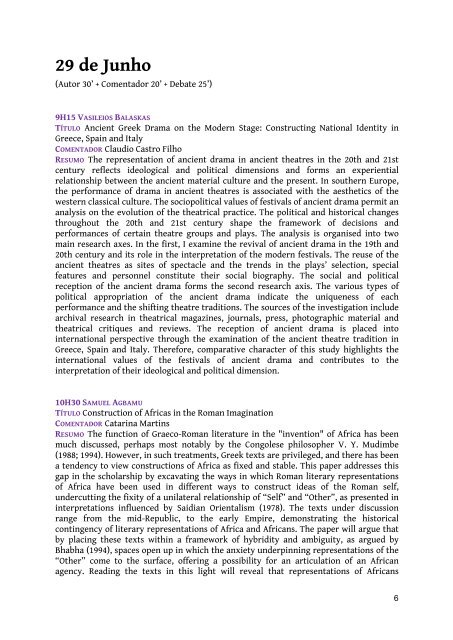Resumos PT
You also want an ePaper? Increase the reach of your titles
YUMPU automatically turns print PDFs into web optimized ePapers that Google loves.
29 de Junho<br />
(Autor 30’ + Comentador 20’ + Debate 25’)<br />
9H15 VASILEIOS BALASKAS<br />
TÍTULO Ancient Greek Drama on the Modern Stage: Constructing National Identity in<br />
Greece, Spain and Italy<br />
COMENTADOR Claudio Castro Filho<br />
RESUMO The representation of ancient drama in ancient theatres in the 20th and 21st<br />
century reflects ideological and political dimensions and forms an experiential<br />
relationship between the ancient material culture and the present. In southern Europe,<br />
the performance of drama in ancient theatres is associated with the aesthetics of the<br />
western classical culture. The sociopolitical values of festivals of ancient drama permit an<br />
analysis on the evolution of the theatrical practice. The political and historical changes<br />
throughout the 20th and 21st century shape the framework of decisions and<br />
performances of certain theatre groups and plays. The analysis is organised into two<br />
main research axes. In the first, I examine the revival of ancient drama in the 19th and<br />
20th century and its role in the interpretation of the modern festivals. The reuse of the<br />
ancient theatres as sites of spectacle and the trends in the plays’ selection, special<br />
features and personnel constitute their social biography. The social and political<br />
reception of the ancient drama forms the second research axis. The various types of<br />
political appropriation of the ancient drama indicate the uniqueness of each<br />
performance and the shifting theatre traditions. The sources of the investigation include<br />
archival research in theatrical magazines, journals, press, photographic material and<br />
theatrical critiques and reviews. The reception of ancient drama is placed into<br />
international perspective through the examination of the ancient theatre tradition in<br />
Greece, Spain and Italy. Therefore, comparative character of this study highlights the<br />
international values of the festivals of ancient drama and contributes to the<br />
interpretation of their ideological and political dimension.<br />
10H30 SAMUEL AGBAMU<br />
TÍTULO Construction of Africas in the Roman Imagination<br />
COMENTADOR Catarina Martins<br />
RESUMO The function of Graeco-Roman literature in the "invention" of Africa has been<br />
much discussed, perhaps most notably by the Congolese philosopher V. Y. Mudimbe<br />
(1988; 1994). However, in such treatments, Greek texts are privileged, and there has been<br />
a tendency to view constructions of Africa as fixed and stable. This paper addresses this<br />
gap in the scholarship by excavating the ways in which Roman literary representations<br />
of Africa have been used in different ways to construct ideas of the Roman self,<br />
undercutting the fixity of a unilateral relationship of “Self” and “Other”, as presented in<br />
interpretations influenced by Saidian Orientalism (1978). The texts under discussion<br />
range from the mid-Republic, to the early Empire, demonstrating the historical<br />
contingency of literary representations of Africa and Africans. The paper will argue that<br />
by placing these texts within a framework of hybridity and ambiguity, as argued by<br />
Bhabha (1994), spaces open up in which the anxiety underpinning representations of the<br />
“Other” come to the surface, offering a possibility for an articulation of an African<br />
agency. Reading the texts in this light will reveal that representations of Africans<br />
6






